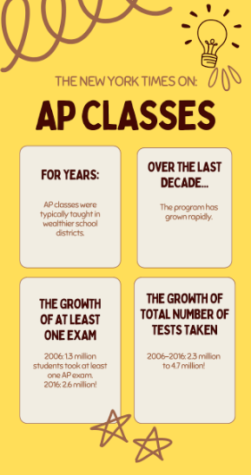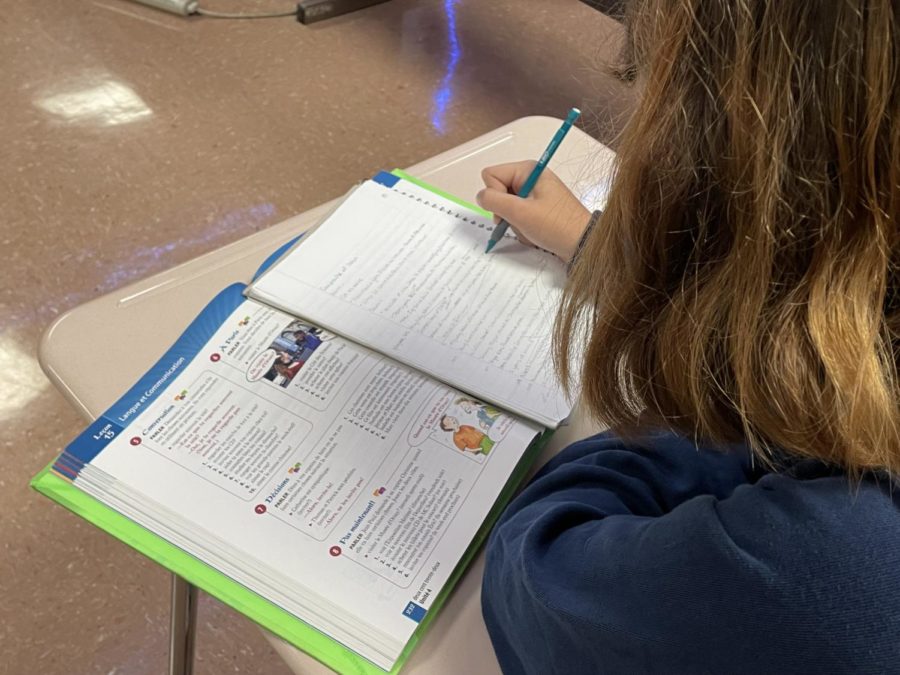AP teacher’s perspective on AP classes; why do students feel the need to take them?
Sophomore Kate Oller studies for her classes.
December 6, 2022
A course in high school that could give you college credit, teach you in a more advanced way, and expand your intelligence: sounds like any ambitious student’s dream, right?
While AP classes are great for the previous reasons, it’s also important for students to take a step back and ask themselves: “Why exactly do I feel the need to take AP classes?”
According to a 2017 New York Times Magazine article, the frequency of students enrolling in AP classes is skyrocketing.

If students choose to take part in something, it must be beneficial. But why are so many students taking these classes if they evoke stress? Our very own AP European History teacher, Mr. Pete van Rossum, talks about the stress of AP classes.
“[The students] work really, really hard and they struggle, and it can create this really bad sort of feedback loop where you’re working hard, you’re getting bad results,” he said. “It’s a lot of pressure and a lot of stress. That’s all because you’re taking the class probably because it’s something that you feel you have to do versus something you want to do.”
So, we return to the main question: why do students feel they have to take AP classes?
“You can get college credit, it looks good on your GPA… I think those are the technical things that everyone responds to, because [AP classes are] competitive and it’s about the numbers,” Mr. Van Rossum said based on his observations. “But I think what often gets ignored is [that] it’s an opportunity to learn a subject in a much more sophisticated way.”
Though a lot of students take AP classes because of the technical, competitive reasons, AP teachers mention that it is preferable they also have other characteristics that make them suitable for the classes.
“They have a genuine sense of inquiry,” Mr. Van Rossm said when describing an ideal AP student. “They’re intellectually curious. They want to learn and they see a value in the knowledge for knowledge’s sake — it’s not just about chasing the numbers.”
At many schools, including Beverly, there is not an extremely regulated process for students to be allowed to take an AP class.
“[Deciding whether or not to take an AP class] requires kids to be realistic,” Mr. Van Rossum said. “Sometimes a kid might say, if you try to discourage them, ‘Oh, that teacher doesn’t like me or they don’t want to give me a chance,’ but sometimes they’re doing you a really big favor. It’s our duty to be realistic about that and assess in that way, and sometimes kids will take that personally.”
AP teachers have experience with the material and difficulty level of their classes, so it’s important for students to listen to these teachers’ opinions.
“I always tell students that AP classes are not age appropriate,” Mr. Van Rossum said. “That’s why it’s called ‘Advanced Placement’. And just because you work hard — and this is a realization that kids learn — it doesn’t mean you’re going to do well. People forget that. You’re still developing your overall skills, [and this is difficult] especially in a history class because it requires life experience … that’s what comes with time and you can’t study that.”
AP classes can seem daunting at the young age students take them, but after all, they are college-level classes for a reason.
“As you get older, everybody will figure it out,” Mr. Van Rossum said. “But you’re being asked to know that at an age that is well in advance of where most people are.”
Sometimes, however, students choose not to assess their readiness level and they believe they cannot get into a “good” university if they don’t take these classes. Many college websites send messages like these, feeding into these students’ beliefs.
College Reality Check says, “The ‘better’ the school, the more they’ll expect that you have challenged yourself in academics. Although it may not be impossible, without any honors or APs, it will be an enormous challenge to get into a ‘good’ school.”
“I see that the problem is not with the student … but that’s the message society does send out there,” Mr. Van Rossum said. “I understand a kid who wants to do as good as they can. And the thing that makes me sad about it is they’re responding to the messages we as a society are putting out there that are kind of ridiculous in a lot of ways.”
Awareness is key in a school to make AP classes more beneficial than stressful.
“At the end of the day, we’re losing,” Mr. Van Rossum said. “It becomes like a big business, chasing numbers, and we’re not thinking about, like, why are you taking the class? Is it something that speaks to you?”





























